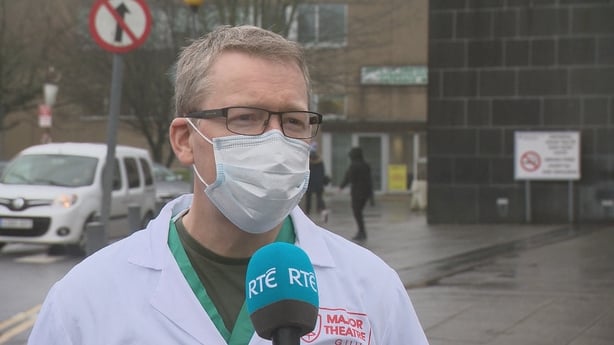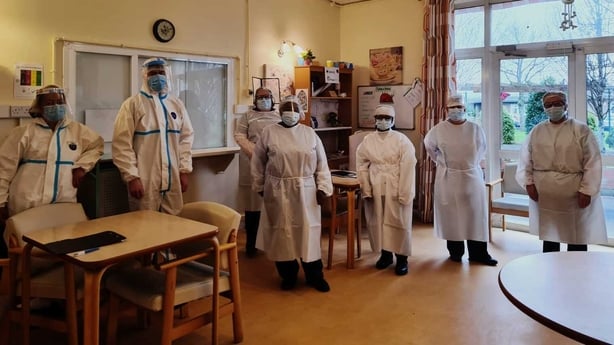"It's been the weekend from hell. First wave hell."
Professor Paul Ridgway is speaking via Zoom from his office at Tallaght University Hospital in Dublin.
On the wall behind hangs a framed slogan 'Keep Going Sure It’s Grand’.
Like most hospitals in recent days, Tallaght has come under pressure from Covid 19.
Its ICU has reached capacity and it is now using its theatre recovery space to "manufacture ICU beds".
"We do have enough beds at the moment, and it's important to say that, but we really need society to do its bit. We need one last push in order to get through what will be a very difficult two weeks," explains Prof Ridgway.
Ireland now has the highest daily number of new confirmed Covid-19 cases in the world for every million people, according to figures published by the Our World in Data organisation. | Read more: https://t.co/jLmibpudjG pic.twitter.com/3QOi6fKrVB
— RTÉ News (@rtenews) January 11, 2021
In Galway, the University Hospital has "four times the number of inpatients" with Covid-19 that it had at the height of the last peak.
"It’s quite a bit worse," according to Dr John Bates, a consultant in intensive care medicine.
It too is readying capacity for what is being anticipated in the coming weeks.
"Things are progressing at a rate that we cannot predict. We were hoping measures put in place two weeks ago would start to bend the curve by now, but as far as I can see the numbers are still going up in intensive care," said Dr Bates.

The pressure is being felt at every level of the healthcare system, from emergency departments to public health services.
Moira Wynne Craig, an Emergency Department nurse at Beaumont Hospital in Dublin, says it "feels different this time".
"It feels more dangerous. What we’re seeing is that people are a lot sicker than they were in March, April and May. They are younger and there’s a higher volume of people who are attending who are positive."
Public health nurses, who make home visits, are only seeing priority patients, such as those who need dressings changed.
"The case load is pared down to the absolute essentials," explains Catherine Rotte Murray, a public health nurse in Lismore, Co Waterford.
Normally public health nurses would be visiting infants and carrying out developmental checks now they are only visiting newborns.
"The long-term effect of missed care is always on our mind," she says.
"There are babies born a year ago who haven’t been seen by the public health nurse since the primary visit and that’s a real cause of anxiety for most of us."
In Dublin, at the Cherry Orchard Hospital long-term care facility for adults, staff are routinely tested for Covid-19 every two weeks.

"That’s helping but we are still at outbreak status," said Varghese Joy, who is the Clinical Nurse Manager.
"It’s not as bad as the first wave but everyone is saying this new strain is more virulent. Fortunately very few staff and residents are affected, but we have to keep a close eye," he said.
Staffing is now a "huge issue for every hospital in the country," according to Sadbh Creed, a midwife at Cork University Maternity Hospital, who said "everyone is really worried."
"Nobody wants to come in on the day where there is four staff short and you have to make decisions about who you take care of and where you prioritise your resources.
"We really don’t want to get to that stage, we’ve seen it happen in other countries and the fear is that we are getting close to that," she said.







